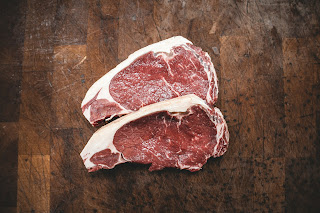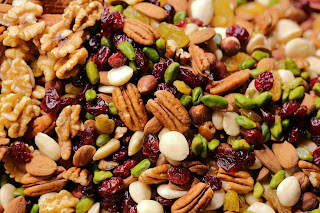Why do we need to eat a balanced diet? Understanding all the nutrients
If you saw my post last month, you’ll know that I’ve come to the end of the understanding nutrients series!
I made this series to give you an understanding of the
nutrients in the food we eat and hopefully show why a balanced diet is so
important.
Now we’ve reached the end I thought I’d do a little summary
page with all the macros, vitamins, and minerals, so you’ve got a quick
reference guide ready to go.
You can see all the more detailed posts here here.
I’ll be starting with the big boys, the macronutrients.
Carbohydrates:
These are the bodies main source of energy! They literally
keep our cells going and act as a storage of energy.
Sources include rice, bread, pasta, potatoes, cereals, fruit,
and vegetables.
Fats:
Fats are also a form of stored energy. As well as that, it
acts as insulation to keep us warm, they provide cushioning for our organs, help
us absorb certain vitamins, and form certain hormones.
Fats can be found in oils, butter, nuts, seeds, and
avocados.
Proteins:
These are the building blocks of our bodies, they form
muscle, tissues, and joints. Proteins also play a key role in the immune
system, hormone regulation, and speeding up bodily reactions.
Protein can be found in meat, fish, eggs, beans and pulses,
and nuts.
Next up we’ve got the micronutrients, which are nutrients we
need in smaller amounts but they’re still super important. And we’ll start with
vitamins:
Vitamin A:
This vitamin is crucial for eye health, the functioning of
the immune system, our reproductive health, and growth and development.
Sources of vitamin A are: brightly coloured orange and green
fruit and vegetables like carrots, sweet potatoes, winter squash, and broccoli.
It’s also found in eggs, and organ meats like liver.
Vitamin B1:
Vitamin B1 is also known as thiamine. Thiamine helps us
convert the food we eat into energy our cells can use. and it helps keep our
nerves, brain, and immune system going.
Sources include wholegrain breads, fortified breakfast
cereals, and some fruit like bananas and oranges.
Vitamin B2:
Riboflavin, or vitamin B2, is needed to maintain the health
of our skin, eyes, and nervous system. Along with the important role of helping
us utilise the energy in our food.
Dairy, eggs, fortified breakfast cereals and mushrooms are
good sources of riboflavin.
Vitamin B3:
Vitamin B3 is also called niacin. It helps release the
energy in food so our cells can use it. It also helps manage our blood
pressure, regulate the nervous system, and supports skin health.
You can find niacin in wheat flour (by law in the UK niacin
is added to white wheat flour), meat, fish, and eggs.
Vitamin B5:
Pantothenic acid is the proper name for vitamin B5. It also
helps us to convert food into energy. And vitamin B5 supports blood cell
production.
Sources include: meats, egg, mushrooms, wholegrains, and
avocado.
You might be spotting a trend here. All the B vitamins have
important roles in energy production!
Vitamin B6:
Pyridoxine or vitamin B6 has roles in energy production. It
also helps us form haemoglobin which is what is in red blood cells and carries
oxygen around the body, and it supports the immune system.
You can find vitamin B6 in pork, poultry, fish, potatoes,
organ meats, milk, nuts, and beans.
Vitamin B7:
Biotin is the name for vitamin B7. And like the other B
vitamins, it helps us convert the food we eat into energy for our cells. biotin
also has a role in our hair, skin, and nails to maintain their strength and
function.
Sources of biotin are: eggs, milk, nuts and seeds, pork, legumes,
fish, and organ meats.
Vitamin B9:
Vitamin B9 is folate, or you may have seen it called folic
acid as well. Folate plays a role in energy production. In addition, it helps
us form healthy red blood cells, form DNA, and it’s crucial in the development
of unborn babies.
Folate is found in green leafy vegetables, beans and peas,
and fortified breakfast cereals.
Vitamin B12:
We're onto the last of the B vitamins, with vitamin B12 or cobalamin.
As you may have guessed, it helps us utilise the energy in our food. But it
also helps keep the nervous system healthy, produce red blood cells and helps
our body use vitamin B9.
You’ll find vitamin B12 in meat, fish, dairy, eggs, and
fortified breakfast cereals.
Vitamin C:
This is important for the function of our immune system,
helps maintain our skin, blood vessels, and bones, and it supports wound
healing.
Sources of vitamin C include citrus fruit, berries, peppers,
potatoes, and broccoli.
Vitamin D:
This helps regulate the level of calcium and phosphate in
the body which are essential for our bone health. It also supports our immune
system.
Food sources of vitamin D are oily fish, egg yolks and red
meat. However, we can also make vitamin D in our skin if faced with direct
sunlight.
In the winter the UK government recommends everyone take a
daily vitamin D supplement containing at least 10ug or 400IU.
Vitamin E:
Vitamin E is one of the fat
soluble vitamins, alongside vitamin A, D, and K. This means they're better
absorbed with fat. It has roles in supporting our immune system and keeping our
skin and eyes healthy.
You’ll find vitamin E in nuts and
seeds, plant oils like olive oil, and cereals.
Vitamin K:
Vitamin K is crucial for blood clotting. This stops us
losing lots of blood if we get a cut. This also helps our wounds heal.
Sources of vitamin K are: green leafy vegetables, vegetable
oils and cereal grains.
And finally, onto the minerals.
Sodium:
This is needed for muscle contraction (this helps us move),
conducting nerve impulses (helps us move, and also think, and feel), and
maintaining the balance of water in the body (we’re made up of majority water).
The main sources of sodium in our diet are in processed
foods that we eat like bread, sausages, bacon and other cured meats, salted
nuts, and soup.
Potassium:
Potassium is also needed for muscle contractions, nerve
function, and maintenance of water balance like sodium. It has the additional
role of supporting heart function, and it gets too low your heart could skip a
beat.
You can find potassium in bananas, tomatoes, potatoes and
other root vegetables, avocado, and dried fruit.
Iodine:
Iodine is crucial for making the thyroid hormones. These
hormones control our metabolism – the reactions that convert food into energy.
It also has a role in bone and health in developing babies.
Iodine is found in seaweed, seafood, and dairy products.
Selenium:
This mineral has many roles, including supporting DNA
production, reproductive hormones, and fighting infection and inflammation.
Sources of selenium are Brazil nuts, seafood, meat, dairy,
and wholegrains.
Zinc:
Zinc is also important for the
creation of DNA, cell growth, the normal functioning of the immune system, and
reproductive health.
Zinc can be found in dairy, meat, poultry, seafood,
wholegrains, legumes, and beans.
Magnesium:
Magnesium has many roles such as helping with energy
production, supporting muscle and nerve function, the formation of DNA, and
regulating blood pressure.
Nuts, seeds, beans, legumes, green leafy vegetables, and
brown rice are all good sources of magnesium.
Phosphorus:
This mineral is essential for the growth and repair of all
the bodily cells. it also is needed for bone health and the creation of our
DNA.
You can find phosphorus in animal products like meat, fish, eggs,
and dairy. It’s also found in fizzy drinks, potatoes, and dried fruit.
Iron:
You may already be familiar with what iron does for the
body. It’s needed to make haemoglobin which is what carries oxygen around our
body. It also plays other roles in the supporting the immune system and
promoting healthy skin, hair, and nails.
Sources of iron include red meat, wholegrains, dried fruit,
beans, pulses, and green leafy vegetables.
Calcium:
Calcium is another mineral you’re likely to be familiar
with. It’s essential for keeping your bones healthy and strong. It also helps
with nerve signalling, muscle contraction, hormone release, and blood clotting.
Calcium is found in dairy products like milk, yoghurt, and
cheese. You can also find it in green leafy vegetables and fish with soft
edible bones like tinned salmon for example.
Copper:
We’re now getting into some of the lesser known minerals,
but copper is still important! It’s needed for heart and lung health, hormone
function, and helps us take in iron.
Organ meats, nuts, seeds, shellfish, wholegrains, potatoes,
and beans are sources of copper.
Chromium:
This mineral plays a role in the control of blood sugar
levels. It also helps with fat metabolism.
There are many sources of chromium like meat, fruit,
vegetables, nuts, and grains.
Manganese:
Last but not least, manganese has roles in supporting blood
clotting, the creation of sex hormones, and helps the body form connective
tissues.
Sources of manganese include wholegrains, shellfish, nuts, beans, legumes, and spices like black pepper.
As you can see, it’s important to have a varied diet!
I hope you enjoyed this post!
Bye for now 👋






.jpg)






.jpg)

Comments
Post a Comment